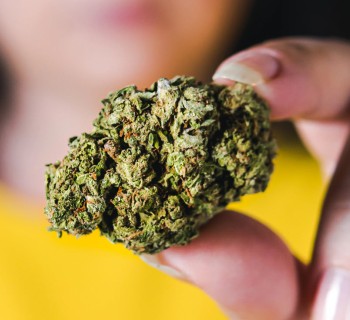
New Jersey, via the Cannabis Regulatory Commission (CRC), has begun to accept applications for recreational cannabis licenses.
On the 15th of December, 2021, the CRC officially began to accept applications from cannabis manufacturers, growers, and testing laboratories, operators. This new step forward is in the bid to break into the legal cannabis industry, putting New Jersey on the map.
The Cannabis Regulatory Commission (CRC) announced that 500 people filed their application within the first four hours the CRC website was opened. CRC executive director, Jeff Brown, said the form was generating 155 users per hour by 1 p.m on that same day. By the end of the day, more than 600 accounts were created on the CRC website.
In an interview, Jeff Brown claimed the CRC is delighted to reach such a landmark. He asserted that new applications continue to come in and that the platform is operating optimally. With everything needed in place, the commission can officially mark the commission of New Jersey's recreational cannabis industry. Jeff believes that granting licenses to manufacturers, testing labs and cultivators will help establish the framework and supply for retailers who will kick off licensing next year.
The Application Process
The entire application process is an introduction to the sales of recreational cannabis with the state of New Jersey. The sales of recreational cannabis were earlier approved by more than two-thirds of New Jersey voters in a ballot measure that took place in 2020. Presently, the CRC can be seen in full action preparing for the sale of recreational cannabis. However, no date has been given to the general public on when sales are to begin.
The recreational cannabis application is quite different from the medical cannabis application that was previously overseen by the Department of Health. There are no deadlines set for the submission of recreational cannabis applications, but, the earlier the better.
As it is, there is no limit on the number of licenses the commission can issue to dispensaries or testing labs and manufacturers. However, the commission can only award a total of 37 licenses to cannabis cultivators until February 2023.
As regards state law, cannabis businesses must follow both municipal and state law. About 70% (400 towns) of all cities had quiet on the cannabis industry around mid-August when laws were passed banning all types of marijuana businesses.
The CRC has noted that applications will be reviewed and licenses will be issued based on equity and inclusion measures. "Equity" applicants are individuals convicted of cannabis-related crimes or who reside in economically disadvantaged zones. These applicants will be of the highest priority and placed in front of the line. Next comes applications with diverse ownership and individuals residing in impact zones. Impact zones are cities or towns with vast populations and high rates of unemployment, high crime rate, and history of cannabis possession arrests.
For every category, microbusiness and conditional applications will be prioritized above standard annual license applications. Conditional applicants in this regard, are entrepreneurs with a solid business plan but need state approval before courting investors.
Licenses will be issued to micro-businesses with limits on the quantity of cannabis that can be grown and sold. Not just that, the number of employees micro-businesses can employ will also be limited. This approach is to help entrepreneurs with small capital also get their foot in the door. Ultimately, microbusiness license holders can but will not be compelled to convert to an annual license. However, conditional applicants are required to ultimately convert to the standard annual license.
Details of the Application process
In mid-November 2021, the CRC held a State League Municipalities Conference meeting in Atlantic City to table the details of the application process. At that meeting, Dianna Houenou, CRC's Chair announced that accepted applicants will either be issued an annual or conditional license. Over half of the towns and cities in NJ opted-out of cannabis licensing altogether.
Houenou asserted that the annual license should be looked at as the bread and butter when someone is applying for a license. The annual license will give businesses the capacity to carry out cannabis operations all year round. The conditional license, on the other hand, is designed to offer applicants enough time to get their acts together. After the license is issued, they then have 120 days to fulfill all additional provisions to earn the annual license.
Houenou also talked about how the commission will prioritize conditional license applications over annual licenses. Houenou cited how the need for property control has limited a handful of entrepreneurs who want to get involved in the cannabis business. She believes the commission is prioritizing conditional license applications to help lessen the burden.
Diversity Concerns
While there have been promises of fair considerations regarding diversity for recreational cannabis licensing, that has not been the case with medical cannabis grower licenses. According to a report from NJ Advance Media, most of the recently awarded medical licenses went to white women, leading to a handful of applicants questioning if they earned extra points for belonging to a minority group during the application process.
However, Brown has made some comments on this issue. He claimed that since CRC was established, the commission has conducted vital tasks under the Department of Health. He asserted that these tasks will help boost supply and provide more access for patients in the medicinal markets. Brown believes that now that the commission has started receiving applications, equity will be prioritized under their new rule.
Former NBA athlete and founder of Viola Brands, Al Harrington, was one of the minority applicants who failed to earn a New Jersey license. Jamil Taylor, Harrington’s application writer, also affirmed how tough it is for Black-owned businesses to thrive in the cannabis industry. He affirmed that the structure put in place is all sad and wrong. Taylor certainly understands how important regulations and licensing are. However, he believes the structure put in place limits vertical integration while they've awarded vertical integration to most white businesses.
Conclusion
Certainly, this new step forward by the Cannabis Regulatory Commission (CRC) will give New Jersey a strong footing in the cannabis industry. And hopefully, the diversity concerns as regards licensing in the cannabis industry will be properly tackled.
NEW JERSEY GOES INTO CANNABIS, READ MORE...
HALF OF NEW JERSEY TOWNS OPT OUT OF RECREATIONAL MARIJUANA?








